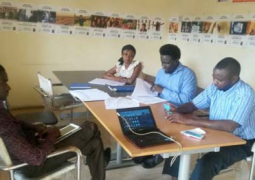The
Universal Periodic Review (UPR) is a unique process which involves a periodic
review of the human rights records of all 193 UN Member States. The UPR is a
significant innovation of the Human Rights Council which is based on equal
treatment for all countries. It provides an opportunity for all States to
declare what actions they have taken to improve the human rights situations in
their countries and to overcome challenges to the enjoyment of human rights.
As
reported in the news the United Kingdom recently delivered a frank, forthright
and candid statement on The Gambia at the 34th Universal Periodic Review (UPR),
categorically addressing the progress made so far by the country. It also noted
the expectation of a future democratic and stable nation. However, serious and
staid concerns are also raised.
The
Gambia in the past regime experienced gross violations of human rights at its
highest. The setting up of the Truth, Reconciliation and Reparations Commission
(TRRC), and the drafting of a new Constitution are all geared towards putting
an end to some of these right violations.
What
is crucial in this post-Jammeh era is for truth to be told and for people to
reconcile, forgive each other; and to pave a way for greater national
development. Forgiveness and national reconciliation are key in any country’s
in development.
In
the past two years, The Gambia has seen significant progress when it comes to
ending human rights abuses even though more still needs to be done. Despite the
progress made, violence against women remains a serious problem in the country,
as highlighted in the report.
Another
area highlighted in the report is the laws that continue to stifle press
freedom and journalists in The Gambia. We all know Gambian journalists now
enjoy a new peaceful working climate as opposed to the former regime, where
journalists operated in fear and intimidation.
Unless
bad laws are all out of the way to ensure a conducive environment for
journalists to operate, journalists will continue to face challenges. To this
day, Gambian journalists are committed to repealing all the draconian media
laws in the constitution through engagement with the Gambia government.
Another
area of concern is the surge in corruption. Nowadays, corruption seems to be
rampant and widespread even though government is keen to combat it in all its
forms.
Government
should also respect the rights to peaceful assembly and association as
recommended in the UPR.
We
must put it in mind that the journey of nation building has never been a smooth
and perfect one anywhere in the world and so ours is not going to be an
exception.
“When
it comes to human rights, there should be no selectivity. Human rights are not
a menu, from which we can pick and choose.“
United
Nations Secretary-General
Read Other Articles In Article (Archive)




